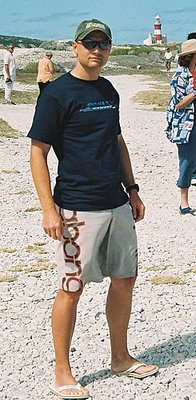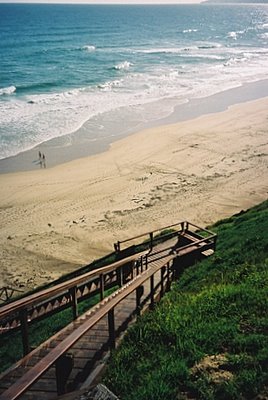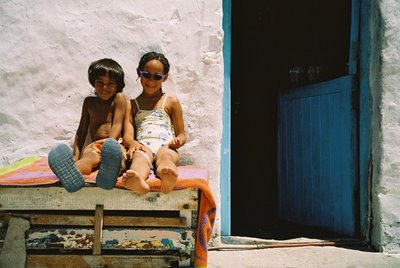
...and why we all need to imagine what it’s like
Take a triathlete, add a propensity for suffering, the capacity to endure, and a governing psychology predicting a never-ending oil famine, and you have the perfect volunteer for this assignment. But bidding your car farewell still means plenty of gnashing of teeth, by Nick van der Leek
Woe betide the world when we suddenly wake up to discover: Ooops. Not enough oil for the world to get to the next station. And the world is some project. There are thousands of cities with black stuff running through their veins (pretty much symbolized by complex grids of glistening tar roads radiating into suburbia.) I mean, just think about the daily demand of just a couple of cities out there with 30 million plus people (like Seoul, Tokyo and Mexico). And everyday those people have to go to work. There’s suburban sprawl everywhere, from Jozi to Jericho, that depends on cars swimming in and out to keep it fed.
Living without a car is a snip if you don’t live in South Africa, or rural Australia, or most of the USA and Canada. I lived in a satellite of Seoul for four years and you know, I didn’t even want a car. London was harder, since taxis are so expensive there and buses just aren’t nearly as ubiquitous as they are in the Far East. Living without a car in South Africa is about as fun as chewing on someone else’s toenails. No, not something anyone would cheerfully volunteer for.
So how did I do it? Well, even Bloem, where you can cycle across the diameter of the city in less than an hour, sooner or later, you’re going to need a car. It’s abundantly obvious from the word go that public transport in South Africa is virtually non-existent. Even if you were determined to use it, that might mean waiting an entire afternoon for a single bus. The alternative is the mini-bus taxi. I considered it once, but kept seeing very clear front page articles, titled: Stupid White Guy Left For Dead After Riding In Taxi, or Idiot’s Body Still Missing: Pair of Oakley’s in a field remain the only clue.
It’s not that I’m a sissy. I’ve done a very risky and illegal 5 hour trip at night along the Philippino island of Palawan in a waist-wide pumpboat. A mini-bus taxi, you must understand, presents a death wish of another order.
So, from the beginning, after returning to South Africa, I relied on the charity of dad to solve my transport dilemma. He has five vehicles (3 four by fours). But after only a few days he became less supportive. He is, after all, a widower who is used to having things his way.
One of the difficulties I encountered from the word go was getting to gym. Today (14 November), a consultant from Virgin Active called me to say I need to renew my membership, which goes to show, it’s been exactly a year since my re-integration into South Africa. Because the first thing I did when I returned to SA was take out a new gym membership. And, with Virgin Active on the far end of town, around 8km from home, getting there, especially at night, was proving tricky. It proved too difficult to get regular transport so I wasn’t able to train (in the gym at least) consistently. I think I went 20 times this year, max. Hence:
Living without a car lesson #1: Forget gym, but make every trip count
To be honest, the effort to get around kind’ve makes the idea of gym obsolete. Thus, the future may be a world with no more gyms, fancy that.
After getting on my dad’s nerves eventually, I did what the middle son eventually must do, and got my lazy, good for nothing butt into a job. I taught economics at a high school, and conveniently stayed in the hostel which was across the road from school, close to gym, and best of all: home cooked meals down the hall. Nevertheless, my own stores ran out pretty quickly, and I tended to visit the shops on a daily basis for airtime, the newspaper, and the odd chocolate. It soon became clear that running out of food made the journey home that much more dangerous (imagine a plastic bag loaded with stuff, swinging dangerously and heavily from handlebars). So, when I went out for dinner or coffee with my long suffering girlfriend (who has a car), I’d stock up on groceries on the way back.
Living without a car lesson #2: Prioritize
Fill up with essential groceries whenever possible, and remember to get the sort of stuff active people eat (think fruits, vegetables and pasta, not bottles of wine, biltong and sushi).
Not having a car means the demands on you increase threefold or more. You not only have less time (since getting from a to b is harder), but less energy, and the result is you’re simply less mobile. To get around as much as possible, use your cellphone, know other people’s schedules, try to synergize your schedule, plans or one-off operation with what others around you are doing. Do the most important stuff first, especially banking, bills, and visits to the doctor and dentist?
Living without a car lesson #3: Delegate, network, synergize – but beware of your credit line
Build up your credit (also called the emotional bank account) with friends and family. Help ‘em out moving furniture or mowing the lawn, or washing dishes at a party.
Delegate, network, synergize: these aren’t just pretty words – if you don’t intend to be miserable you’ll need to be very skilled at being in the right place at the right time in terms of yourself and other people. It’s not an exact science, it’s an art, believe me. Know the routes your friends use to commute to work. Know where they have lunch. Know when and where they train. Join in, or tag along and get your errand done. Don’t use up your credit in one go either.
One useful trick that I used was test driving cars for a magazine I did some freelance work for. Technically it’s not a real long term solution, because it’s actually using someone else’s car. I got to test drive an Isuzu double cab, a Toyota Yaris, an Alpha Romeo GT and others – and I have to admit, whenever I got my hands on the latest in automobile technology it was hard not to be seduced by it. Oh the power, the elegance, the ease of it! But what a pity, I’d invariably think, that these wonderful machines run on stuff that we’re eventually going to run out of. Can you honestly enjoy life on the highway, in air conditioned comfort, and using push button power when you know it’s built on a platform that can’t possibly last?
Living without a car lesson #4: Roll with the punches, and expect a few on the nose
Once I found myself in a situation where I woke up one morning, feeling dizzy and weak and unsteady on my feet. I thought it was just a mild case of flu. The rules at work required a doctors certificate if I was absent for more than two days, so I needed to get to a doctor. It was snowing (yes, snowing in Bloem) the day I needed to go to the doctor. Sure, I could walk or cycle to the doctor and risk getting pneumonia on top of what I already had. So I called just about everyone I could call. No one could help, especially since the appointment was midmorning. Family had gone away to the Maluti’s. That was when I realized how helpless I really was. When you really have to depend on someone, and no one can help you when you need help, you know you’re in trouble. I had to postpone the appointment, and when I finally made it he [the doctor] booked me off for the rest of the week, saying I had a serious bacterial infection in my lungs. That week in bed felt like a month.
Living without a car lesson #5: Adapt
What are the options? If you don’t have transport, get the mountain to come to you. Get all the numbers for food delivery, you’ll need them. Just today I found a new place called Ouma’s Kitchen that delivers wholesome meals in Styrofoam containers by bike messenger – for less than R30!
Or, instead of getting fat on takeaways, get yourself a mountain bike and get yourself around on your own steam.
Living without a car lesson #6 Accept that you’ll be less independent
Realize how selfish we are as a society right now, and those we seek to depend upon are just as selfish. Each person is expected to have their own car, own house. That’s new for this era. Think of cavemen. They shared everything, including the cave. Imagine cave people expecting to have their own cave to themselves. It is very hard to become dependent (once you’ve been independent) and it’s also hard for people who are independent (girlfriends, family) to deal with you. You don’t have a car! It just doesn’t fit into their paradigm. Of course, someone who doesn’t want anything from anyone else is also very hard to help.

Living without a car lesson #7 Get used to wishful thinking
I think the future is going to be filled with reminiscing about ‘the good old days’. What’s not so good about now is that things are more important than people, and that our relationships with stuff have taken precedent, in many cases, over our relationships with people. People these days seem to think very little about scrubbing a friendship because of some minor transgression. Why? Because there are so many other diversions to occupy our time. This commitment to materialism is a lifestyle choice that is the rule, never the exception: after all, we spend most of our time working to buy things, then having those things insured, and then keeping these possessions in a thing container (called a house) which also happens to be where we put ourselves and our family. Take it from me, we’ll yearn for now some day, but actually we’re better off with less stuff, and more time one on one with ourselves and each other.
Living without a car lesson #8 Get grateful
The party isn’t over yet, so enjoy it while you can. Enjoy the fact that you can drive to a cycle race for the weekend in a faraway city. Enjoy that you can go for holidays on the beach even if you life in a desert. Enjoy getting takeaway burgers at a drive thru (without getting out the car). Enjoy the fact that you can drive for 10 or 15 minutes to the nearest supermarket, and have access to products from as far away as China, New Zealand and Finland. Enjoy how magically easy it all is, and how incredibly powerful an average individual can be (even though it turns out to be for a very limited blip on the human timeline).
Living without a car lesson #9 Take Deep Breaths
When it’s finally over, when the lights go out and the lines at petrol stations become permanent monuments, whole communities are going to become morbidly depressed and apparently powerless. Reality isn’t going to be pleasant. TV channels will be filled with practical DIY shows, including Planting Your Own Vegetable Garden, and Campfire Stories. Survivor will cut too close to the bone. Irony, in fact, will be a luxury we can no longer afford. Entertainment will wither as more of us find we need to get to work to feed and clothe and equip ourselves based on local resources and piecemeal infrastructure. Learn to handle plenty of extra stress and disappointment, and try to do so by getting busy with urgent projects.
Living without a car lesson #10 Reconnect
The chances are very good that if you're without a car for any length of time either your girlfriend will dump you, or your family will disown you (not literally, just in terms of their behaviour towards you). More than likely, both will happen. With lots more free time, you'll have the option of choosing with whom you'd like to reconnect, and you'll also discover to what extent being in a car disconnects you from the world at your doorstep.

The good news is that our current lifestyles are actually cancer-inducing. Millions a year die of heart attacks. Half of married couples divorce. Reconnecting doesn’t mean turning on your cellphone or sending an email. It means the opposite. Look someone in the eye. Stop the clocks and give someone your time and full attention. More important, give yourself the time of day, and reconnect with who you are. One long walk is the first step in that direction. While some have a governing philosophy of ‘Kill a rhino before it becomes extinct’, I’m inclined to want to buy a Toyota Ay-go, and do a round-the-country-trip before the oil runs out. But I have a conscience, and I know a race is coming that will require preparation.
We will have to reconnect towns to organic systems – that means streams and pastures. Cities, filled with top-heavy infrastructure and inefficiencies like skyscrapers, will evacuate, the principal activity everywhere will become, surprise surprise, agriculture.
I believe we already know this, but some of us are less willing to own up to it than others. To the extent that we can accept the coming reality before it engulfs us, we’ll be able to move safely and happily on our road – wherever it goes.
No comments:
Post a Comment